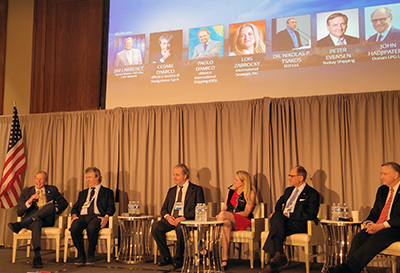Shipping’s current fortunes jollied along the top level ‘commodore’s debate’ at CMA Shipping 2023 (March 21-23), with the challenges that are testing maritime good humour largely left for individual panel debates across the three-day event in Stamford, Connecticut.
In an upbeat session led by moderator Jim Lawrence, Paolo d’Amico (d’Amico International Shipping chairman and CEO) was welcomed to the rostrum as 2023 commodore, joining his cousin Cesare d’Amico (CEO, d’Amico Dry Cargo), Seaways CEO Lois Zabrocky, Dorian LPG CEO John Hadjipateras, former Teekay President and CEO Peter Evensen, and TEN President and CEO Nikolas Tsakos. While war in Ukraine, inflation and the threat of recession peppered discussions, only a reference to future fuels selection threatened to add any heat, with Evensen observing that regulatory requirements meant that “no one knows what to order”.

The same uncertainty had loomed large in a keynote address offered by Knut Ørbeck-Nilssen, CEO of maritime at DNV on the opening day of CMA, who predicted “new fuels and infrastructure will be late and in short supply.”
For an industry facing up to the IMO’s carbon intensity indicator and the EU’s coming ETS emissions cap-and-trade scheme, CMA 2023 was therefore understandably fully covered for energy transition talk. Batteries, fuel cells, wind and nuclear were all given opportunities to press their case, as well as the methanol, biofuels and other combustibles which offer lower carbon alternatives based on conventional engine technology – let alone 800 ships on order that are due to run on LNG.
Other industry issues in need of change included the crewing shortage crisis, sustaining progress being made on equality and diversity, shipping’s continuing vulnerability to cyber threats and its need to better harness digital tools to improve safety, environmental performance, crew welfare and efficiency.
But perhaps the largest cloud dampening CMA’s party mood hovered over a sanctions panel, whose concerns included – but went far beyond – the ‘dark fleet’ of ships which is emerging to serve trading restrictions imposed by the US and EU.
The price cap being imposed on Russian oil exports is an ambitious bid to exert market control over one of the world’s most necessary and traded commodities, but it is also only one part of a new dynamic shaping global shipping and the financial services behind it. Another was flagged after the 2018 US withdrawal from the Joint Comprehensive Plan of Action (‘the Iran nuclear deal’), in an EU blocking statute response which – in principle – leaves those following US secondary sanctions open to legal action.
NorthStandard Head of External Affairs, Mike Salthouse cited China’s 2021 framework for Rules on Counteracting Unjustified Extra-territorial Application of Foreign Legislation as another example of ‘blocking’ legislation whose impact may only become clear in the event of any future disputes.
Instead of global economies spoon-fed by frictionless trade, ship owners, charterers and financial services may soon have to consider more localised approaches. In the case of a further escalation of current trade wars, those buffeted by sanctions on one side and blocking legislation on the other may need to make trading choices based on whether the imperative is the capital most readily available in one part of the world or the cargoes coming in large part from another.

For more insights or to meet the JLA Media team at an upcoming event, get in touch or follow us on LinkedIn.
